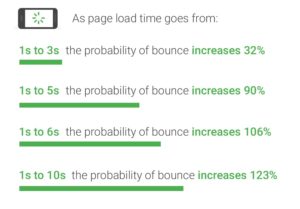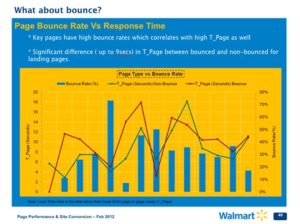Page Speed Part 2: Why Does It Matter?
User Experience
Getting information to your users faster is always better. Page speed scores may appear to be an arbitrary number that have more to do with the underlying technologies of a webpage, but improving them will automatically improve the experience for your users. Because more and more people have access to broadband connections and faster mobile speeds, when a page loads slowly it is far more obvious than it used to be. You can see how quickly users will drop a page in this infographic provided by Google from their own research:
Additionally, users that experience a noticeably slow page are less likely to return to that site in the future. A slow site can give the impression that it is untrustworthy, which will also affect the likelihood of a user returning to the site.
Better Conversions
Research by Kissmetrics has shown that 40 percent of users will abandon a page that takes more than three seconds to load. This means that if you have a slow loading page, you could be losing a significant percentage of your conversions before they’ve even had a chance to view the page.
For e-commerce the difference can be even more distinct. Walmart demonstrated a 2 percent increase in their conversions for every one second improvement that they made to their page speed. They also showed a direct correlation between bounce rate and site speed:
Improved Indexing
In 2010, Google Announced that page speed had become a ranking factor for websites. While having a fast site doesn’t automatically mean that you will rank higher than other sites with similar content, but it does mean you won’t be penalized for having a slow site.
In addition, when your site is being crawled by bots such as Google there is a factor that determines how quickly the indexing occurs. This is commonly referred to as Crawl Budget. According to Google:
“If the site responds really quickly for a while, the limit goes up, meaning more connections can be used to crawl. If the site slows down or responds with server errors, the limit goes down and Googlebot crawls less.”
What this means is that when your site is faster, the Googlebot is able to index more pages within its allotted crawl budget, which then helps your site content become indexed quicker.
Conclusion
Based on a number of factors outlined, there are direct, measurable benefits to improving your page speed. Make sure to check back for the final article in this series where we’ll cover ways that you can improve your site’s page speed without sacrificing the user experience or content quality.
Wondering where your website falls on the speed scale? Contact us today for a free assessment.